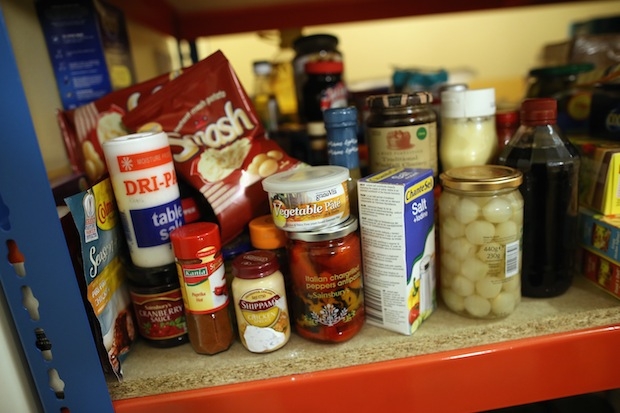Frank Field just about managed to hold together a cross-party consensus on the need to tackle hunger in this country at the launch of the ‘Feeding Britain’ report. At the end of the launch, at which Justin Welby and all the politicians involved spoke, the Labour co-chair of the inquiry said brightly ‘there you have it, a range of views and yet we have a united report!’ It was a tricky job though.
Baroness Jenkin didn’t help herself by telling the room in a rather garbled response that ‘poor people can’t cook’. Here, for the avoidance of misunderstanding, is her full quote:
‘There is some amazing best practice out there which we want to build on. But the other point is that we have lost a lot of our cooking skills, and poor people don’t know how to cook, and I had a large bowl of porridge today, it cost 4p, a large bowl of sugary cereals will cost 25p. So I really want, I hope that the supermarkets are listening to us, the fact is that we have heard that only two per cent of supermarket surplus is given to people who need it, when at the same time very poor people are giving to even poorer people, seems to me to make no sense at all. We have a need, we have a resource, we should put them together.’
She has since apologised for the comments, which were clumsy but still had a basis in what the Inquiry itself found, which is that ‘Whilst we have heard how many families manage to buy and cook food on a shoestring budget for extended periods of time, we have seen also that a number of individuals and families are unable to do so’ p29. If Jenkin’s unscripted comments become the takeaway story from today, then people are deliberately trying to miss the point of the report.
Her Tory colleague John Glen warned against ‘shrill’ attacks on departments, which was followed by Labour’s Emma Lewell-Buck launching an attack that while not shrill, was pretty darn forceful and rather partisan. She made quite clear that she wanted to make a report that was supposed to be about moving on from politicians blaming one another an opportunity to blame someone:
‘It’s clear that prices have not kept pace with incomes and that supermarkets do waste a lot of food, and we do address these issues in the report. But in the past, we had a welfare state with a supportive safety net. When I was unemployed, when I and my family members fell on hard times, I was really proud to live in a country where we would be able to get help. This sadly is no longer the case. I remain proud of my country, but I am not proud of those at the top of it who are making these decisions. Because the reality is this safety net no longer exists. Since the Coalition brought in their welfare reforms, we’ve seen a harsh and punitive regime and a culture that no longer talks to people and tries to understand their hardship but sanctions them without hesitation and cuts them off from financial support without care.’
Oh well, it must be difficult when you’re an MP trained in partisan attacks to step back for a minute and talk about how to move on from the current mess. If the struggle to be non-partisan wasn’t clear to the audience, the Minister for Civil Society Rob Wilson helped them out a little more with a response that told them ‘our long-term economic plan is working’ and mentioned the phrase ‘hardworking families’.
Wouldn’t it be nice, just once, for a minister to say that he’d at least ‘look at’ some suggestions on current government policy? Neither Wilson nor Number 10 seem to think so, with the Prime Minister’s official spokesman today telling us that he thought the current system was ‘the right one’ but that the government was keen to do more on a separate issue, which is the time it takes between an application for benefits being grants and those benefits being paid. When we asked whether this meant that the government would not look at any concerns raised about benefit sanctions, the spokesman said:
‘I think people will understand why we have the approach that we do, and, er, the PM’s view is that is the right one.’
We will hear more from ministers on this matter today, as it is Work and Pensions Questions in the Commons in a few minutes’ time.
The point about food banks and today’s report is that we are where we are, and where we are is currently a stand-off between two political parties who’ve seemed more interested in petty point-scoring than addressing the issue. There is a fragile consensus now for change, but given the survival of that consensus relies on people suppressing their tribal instincts to fly at one another’s throats, it’s going to be very hard to maintain.







Comments